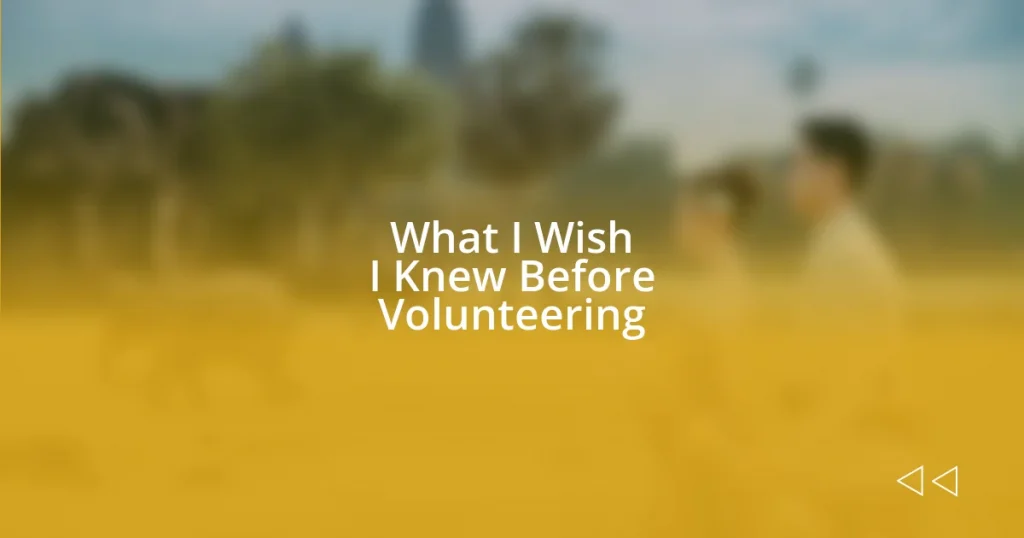Key takeaways:
- Thoroughly research the organization’s values and mission to ensure alignment with your beliefs for a fulfilling volunteering experience.
- Prepare for cultural differences by understanding local customs, learning key phrases, and being open to adapting to new environments.
- Reflect on your volunteering experiences and challenges through journaling or conversations, as this can enhance personal growth and reinvigorate your passion for service.
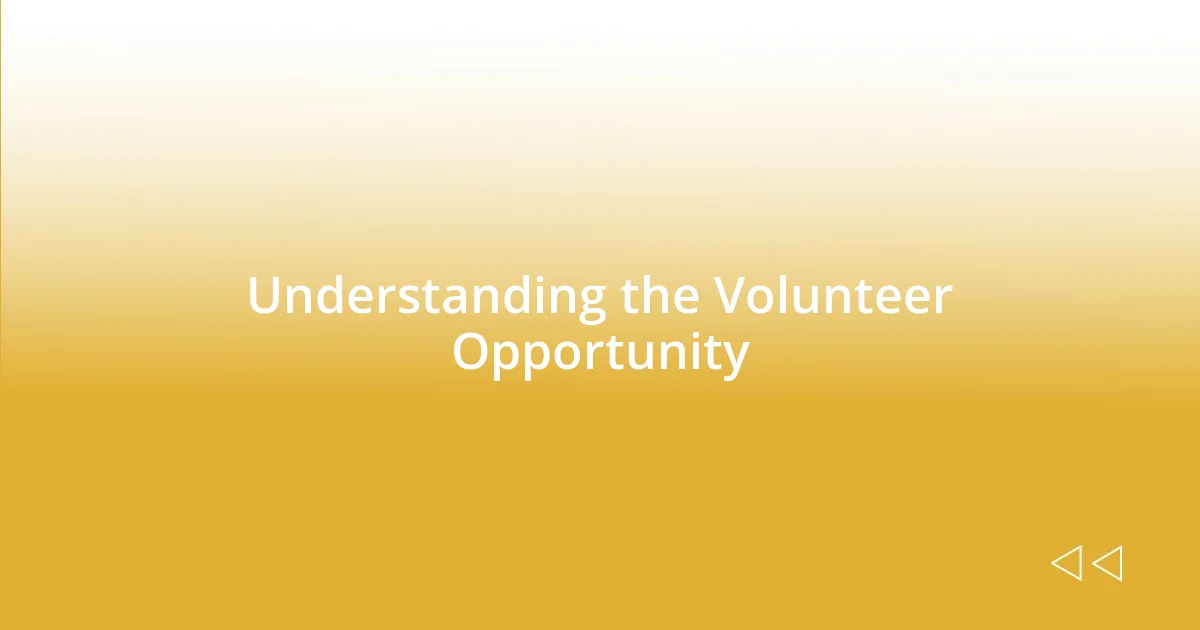
Understanding the Volunteer Opportunity
Diving into a volunteer opportunity often feels like stepping into the unknown. I remember the first time I signed up; I was filled with excitement but also a lot of questions. What would my day-to-day look like? How would I connect with the community I aimed to support? Asking these questions helps clarify whether this opportunity aligns with your interests and skills.
It’s essential to thoroughly research the organization behind the opportunity. I once joined a project without delving deep into its mission. While I enjoyed the experience, I later realized that their values didn’t quite resonate with mine. Have you ever worked for a cause that didn’t ignite your passion? Finding alignment between your beliefs and the organization can elevate your volunteering experience from merely fulfilling to truly transformative.
Moreover, understanding the potential challenges is just as crucial as knowing the rewards. During my first placement, I faced unexpected emotional tolls when handling sensitive issues. Can you imagine being caught off guard by the realities of someone else’s struggles? Recognizing these challenges beforehand not only prepares you but also enhances the impact you can make while volunteering.

Researching the Organization’s Values
Researching an organization’s values is vital to your volunteer journey. I recall a time when I impulsively chose a group based on its flashy website and positive reviews. Unfortunately, once I started, I realized their core values—focused on profit rather than community well-being—did not align with what I believed in. This misalignment made it tough for me to feel motivated and fulfilled in my role.
Another aspect to consider is how the organization communicates its values. Have you ever checked an organization’s social media or newsletters? I’ve found that these platforms often reveal their priorities and culture in surprising ways. For instance, one nonprofit I admired frequently shared stories highlighting their commitment to sustainability. This resonated deeply with me and reinforced my decision to volunteer there, as I felt I could contribute to a mission that matched my principles.
When researching, it’s also helpful to seek testimonials from former volunteers. I’ve spoken to individuals from various organizations, and their experiences can provide valuable insights into what it’s really like on the ground. Did they face conflicts between values? What were their impressions of the organization’s leadership? These conversations often shaped my understanding of the alignment—or misalignment—between my passions and the organization’s mission.
| Criteria | Organization A | Organization B |
|---|---|---|
| Core Values | Community Empowerment, Inclusivity | Profit-Driven, Efficiency |
| Communications Style | Storytelling and Sharing Impact | Formal Press Releases |
| Volunteer Experiences | Positive Testimonials, Strong Advocacy | Mixed Reviews, Limited Engagement |
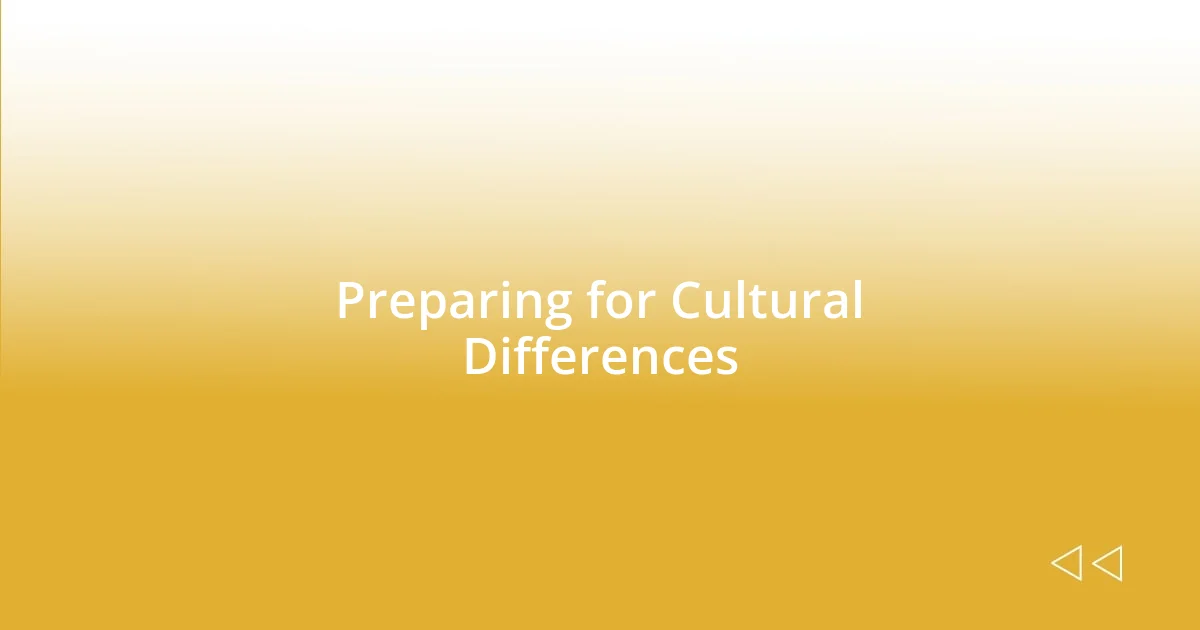
Preparing for Cultural Differences
Understanding cultural differences is a key part of preparing for any volunteering experience. I still remember that moment abroad when a simple gesture, like a handshake, was met with hesitation. It was eye-opening to realize that what feels normal to me isn’t universal. Engaging with local customs means being open to adapting my behavior and expectations, which can be a significant learning curve.
To help ease the transition, here are some practical steps I recommend:
- Research cultural norms: Look into the host country’s customs and etiquette. Knowing what’s appropriate can prevent awkward moments.
- Learn key phrases: Even a few words in the local language can show respect and willingness to connect.
- Connect with locals: Make an effort to engage in conversations with community members. I’ve found that they often appreciate curiosity and genuine interest in their culture.
- Be mindful of non-verbal cues: Body language varies across cultures. Pay attention to how others communicate feelings and intentions without words.
- Stay adaptable: Keep an open mind about differences. I learned that flexibility is often the key to meaningful interactions in diverse environments.
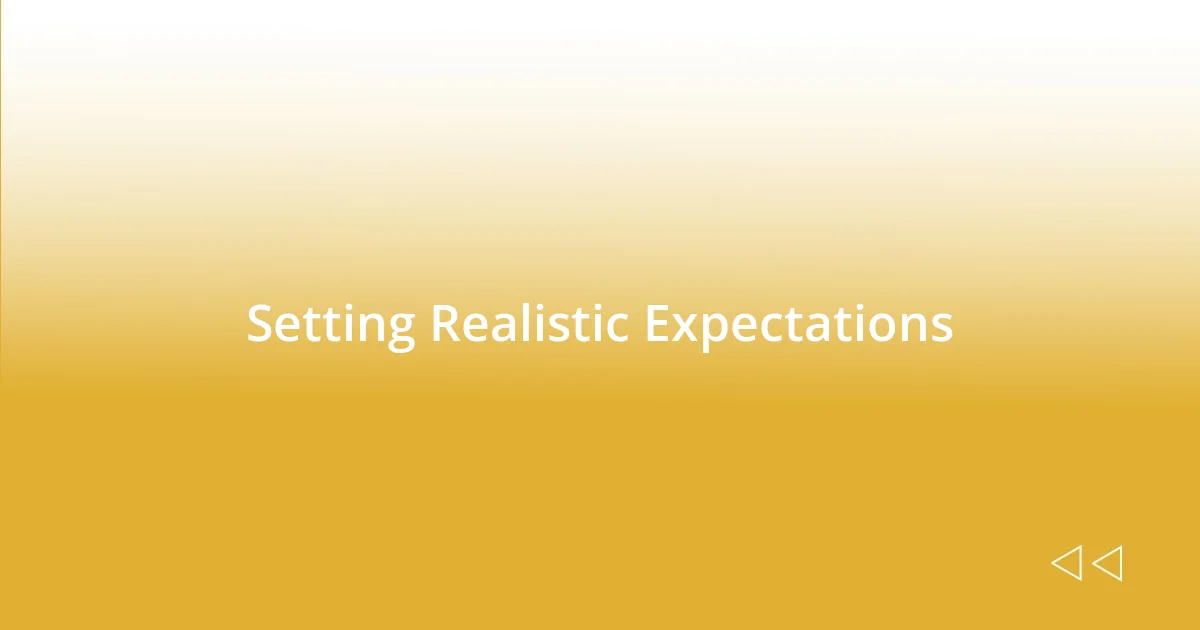
Setting Realistic Expectations
Setting realistic expectations is crucial for a positive volunteering experience. I remember a project where I thought my role would involve hands-on work with participants, but instead, I found myself mostly behind a desk helping with administrative tasks. At first, I felt disappointed, wondering if I had made the right choice, but soon I realized that these support tasks were just as vital to the organization’s success.
It’s also essential to understand the time commitment. Once, I volunteered for a cause that claimed it was flexible, but the reality was that consistent hours were expected. This discrepancy led to feelings of frustration as I juggled my other responsibilities. Have you ever been caught off guard by similar circumstances? It taught me the importance of asking detailed questions upfront and getting clarity about what is truly required.
Lastly, consider the emotional challenges of volunteering. In one instance, I was deeply affected by the stories shared by those I was helping. I entered thinking I could easily provide support, but the emotional weight was heavier than I expected. Acknowledging the emotional side is important. I found it helpful to talk about my experiences with fellow volunteers, which made the journey feel a little less isolating. Isn’t it reassuring to know that others share similar feelings?
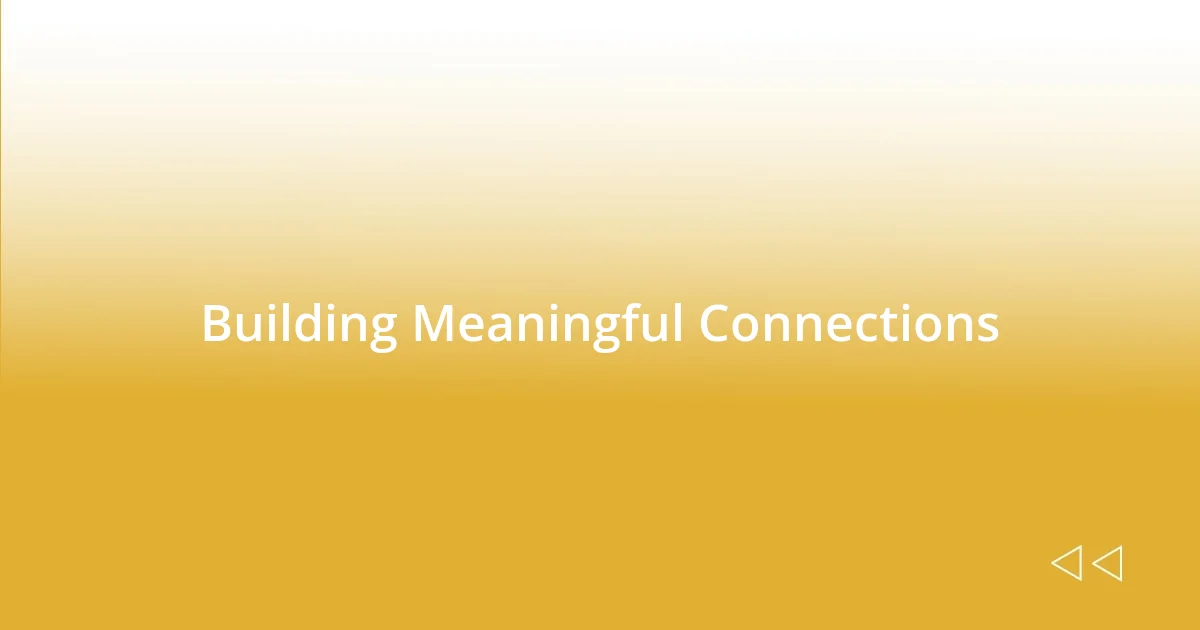
Building Meaningful Connections
Building meaningful connections while volunteering is one of the most rewarding parts of the experience. I vividly recall a time when I volunteered at a local shelter. Initially, I felt like just another face in the crowd. However, when I began to share my story and listen to the experiences of those I was serving, everything changed. It’s amazing how vulnerability can spark authenticity and build trust. Have you ever felt that instant connection with someone through a shared experience? It’s such a transformative moment.
Sometimes, the best connections come from unexpected places. I once struck up a conversation with a fellow volunteer during a lunch break. We bonded over our shared passion for photography and soon found ourselves collaborating on a project to document our volunteer work. This partnership not only enriched my experience but also revealed the depth of camaraderie that can develop through shared interests. Isn’t it remarkable how a simple conversation can lead to lifelong friendships and shared goals?
Another insight I’d like to share is the value of being present. I’ve realized that when I genuinely engage with others during breaks or activities, the relationships formed are much more profound. One evening, amidst casual conversation over dinner, a participant opened up about their dreams and challenges. It struck me how these moments of shared humanity bring purpose to the work we do. Have you ever experienced that sense of connection during a casual encounter? Those fleeting moments often become the highlights of our journeys.
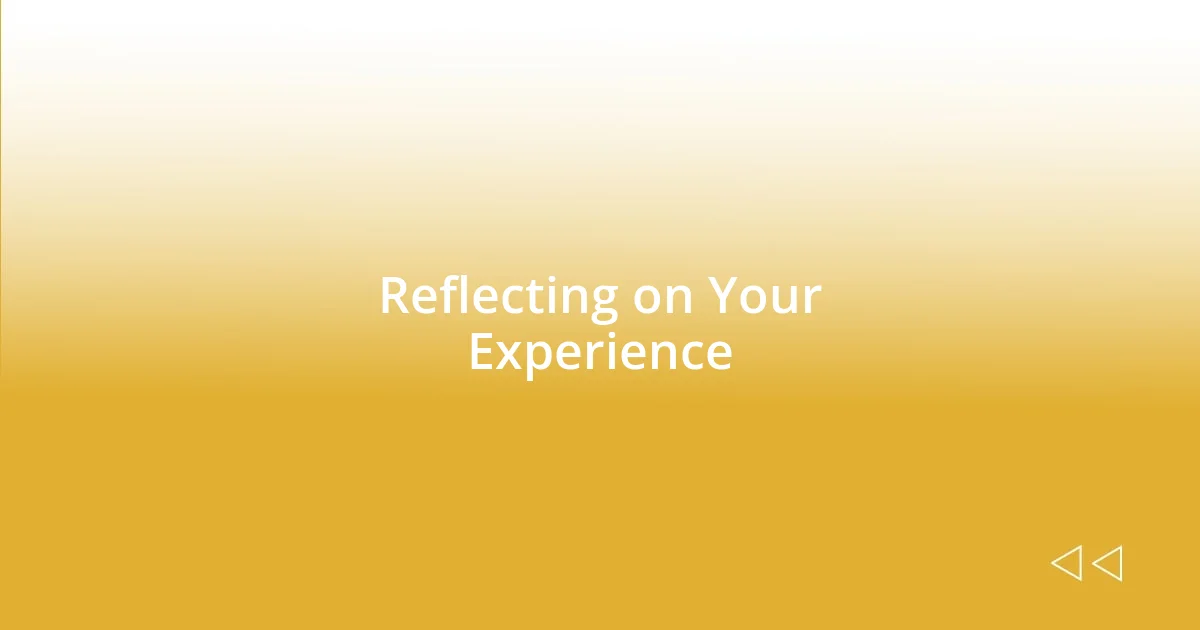
Reflecting on Your Experience
Reflecting on your volunteering experience can be incredibly enlightening. I remember one particular project that, at first, seemed burdensome. After some time, however, I realized how much I had grown through the challenges faced. Looking back, what stood out was not just the tasks I completed but the resilience I developed. Have you taken time to consider how challenges can shape you positively?
Sometimes, I find journaling about my experiences creates a clearer picture of my growth. After volunteering with an organization focused on mental health, I started writing down my feelings and observations. It was cathartic and helped me process what I saw and felt, ultimately leading me to understand my passions better. Have you ever tried to put pen to paper after an emotionally charged day? It can offer surprising revelations.
Additionally, I often revisit conversations I had during my volunteering stints. Recently, I recalled a heartwarming chat with a child I mentored. Reflecting on his dreams and seeing the world through his eyes brought up emotions I hadn’t anticipated. These moments remind me of why I volunteer in the first place. What are your standout moments? Sometimes, taking time to reflect on these can reignite your passion and purpose in volunteering.










